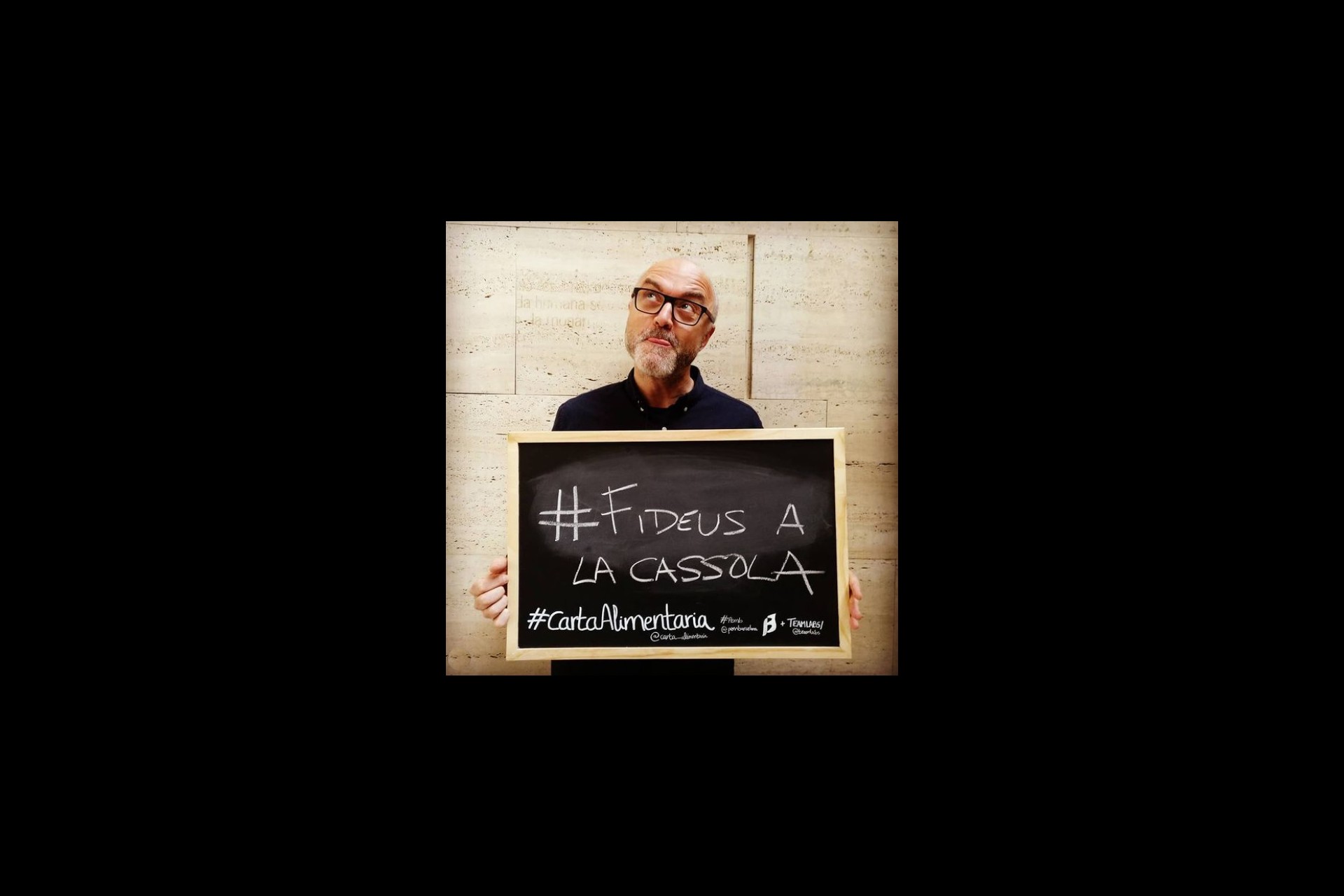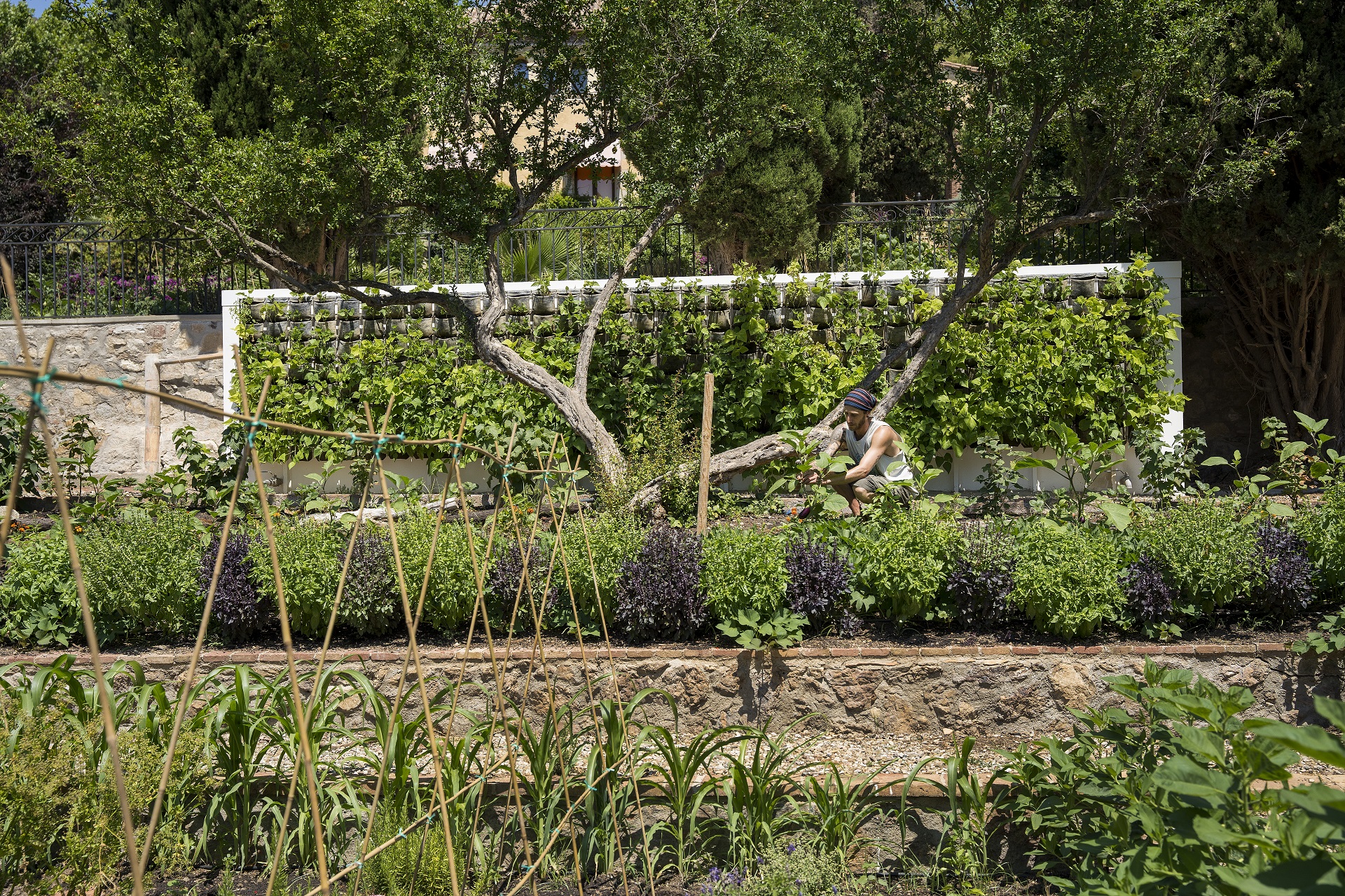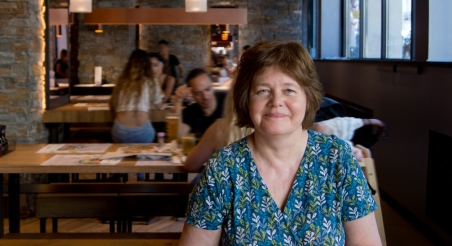Economist and geographer Oriol Estela Barnet (Barcelona, 1969) is one of the key people in the strategy to promote food policies in Barcelona and its metropolitan region. His schedule is full of open fronts that are not at all easy to understand, manage and solve, and despite this, we always find him with a smile on his face. Talking to him about these issues, it becomes obvious that promoting the transition to a model of greater food sovereignty is much more than his current job: it is his passion, his excitement and his connection to a part of of course he doesn't want to lose.
A part that he discovered, as a child, in the summer house that his parents had in Vendrell. There, there were peach trees and his family still bursts into laughter remembering the way he ate them. He's joking, too, with this unexpected memory assault. But the truth is that he does not forget the delight of feeling the velvety ripeness of a freshly picked fruit in his hands and the sweetness of the juice that licked his lips, chin and cheeks.
We speak with the coordinator of the Barcelona Metropolitan Strategic Plan about a very personal pleasure that, however, has important political, social, environmental and economic implications.
From the Metropolitan Strategic Plan of Barcelona (PEMB) you are promoting the creation of the Food Charter of the Metropolitan Region to accelerate the transition towards a model of greater food sovereignty. Of all the actions you defend, which would be, from your point of view, the most urgent and priority?
From the point of view of urgency, it is clear that the food emergency that many people are suffering from should be the first thing that we should address. This was seen during the hardest moments of the confinement, when a movement of linkage was spontaneously generated between small local producers and neighbours of the neighbourhoods of Barcelona and the metropolitan area. For example, I live in Poblenou, and here, in the first months of the confinement, five new consumer cooperatives appeared, and they did so because someone made a call saying that certain producers in Vallès Oriental and Maresme were having difficulties giving output to their products. In Baix Llobregat, AlterBanc acted as an alternative to traditional food banks by supporting local organic producers. In other words, if we talk about food emergencies, I think there is still a lot of room to connect local producers with the groups that suffer the most.
«There is still a lot of space to connect local producers with the groups that suffer the most» Oriol Estela
In terms of importance, which action do you think would be particularly key to developing a fairer, safer, sustainable and healthier food system?
I think it is essential that there is a local public policy related to food, and this is precisely the spirit of the Food Charter of the Metropolitan Region of Barcelona (CARM), promoted by the PEMB. In addition to showing a broad consensus around the need to change the food model, what we want to achieve is that local bodies understand that food is a fantastic approach to address many of the problems of towns and cities with a sustainable perspective and healthy, and also strengthen the local economy. We understand that food is a basic and fundamental need of people and, therefore, our aim would be that, after the next municipal elections, there are many more councilors for food or the appearance of other political figures who share this look at food.
«We want local bodies to understand that food is a fantastic approach to address many of the problems of towns and cities with a sustainable and healthy perspective, and, in addition, to strengthen the local economy» Oriol Estela
What role should local governments play in making the food model change? Do you think that agri-food systems must be controlled from the territory, that is to say, on a local, county, regional or at most state level? Or, on the contrary, do you think that the social, political, economic, environmental and cultural implications of food systems are so serious and deep that they require to be addressed with a global perspective, that is, from supranational organizations such as the European Union?
For us, at the PEMB, the principle of collaboration is fundamental, and that is why we are very happy to have around seventy institutions adhering to the Food Charter of the Metropolitan Region, including administrations, companies, research centres, citizen organizations, cooperatives, farmers' unions, etc. But what we want is not only that they sign it and acquire the commitments established by CARM, but that they put on the table a project that they believe can be worked on together with the other actors. And we do it because what we mainly want is to forge partnerships and promote mutual knowledge. Even if many actors are working on different issues, if there is no global vision and no work is done in a coordinated manner and with shared objectives, the policies that are undertaken can even become counterproductive.
«If there is no global vision and no work is done in a coordinated manner and with shared objectives, the policies that are undertaken can even be counterproductive» Oriol Estela
In an analysis report recently published as part of the BCN Smart Rural strategy, we have seen that the city of Barcelona has lost 98% of its arable land in the last sixty-two years, the Barcelonès, in 98% of the fields, and Baix Llobregat, 73%. If we add to this fact the negative effects that climate change has on agricultural production and also the depletion and loss of quality of agricultural soils, do you think that the municipalities that want to guarantee the food security of the population should promote protective measures of their agricultural spaces?
Totally. I believe that the local administration should introduce measures to protect its agricultural territory, but also to manage it. We have seen it in the Baix Llobregat Agricultural Park and other similar spaces that have been set up: management is not easy. In my opinion, if the promotion of industrial estates led to the creation of the economic promotion areas of the town councils, the promotion of protected agricultural areas should also lead to the creation of a local public policy that is responsible for managing agri-food issues.
«The promotion of protected agricultural areas should lead to the creation of a local public policy that is responsible for managing agri-food issues» Oriol Estela
What else do you think local administrations can do to incorporate sustainable food into the daily lives of their citizens?
If we talk about local administrations, planning competence is obviously very important, but councils can intervene in almost all links of the food chain. We know, for example, that farming has a generational problem, and local administrations can promote productive opportunities, and train and encourage people who want to work in the countryside. They can also articulate marketing channels; in fact, one of the first projects to come out of the CARM is the creation of a Proximity Agroecological Exchange Center (CIAP) that can provide a marketing alternative to small producers in the territory and allow them to easily place their products in the great metropolitan market. Another thing that councils can do is for the points of sale to get more involved and bet on local products, and here the main asset we have are the municipal markets, but revitalization actions can also be done in the rest of local shops. The public purchase of food for school canteens or other collective catering services is also in the hands of councils, and the same goes for waste management and the fight against waste. As you can see, the actions of the councils in the food systems are very transversal and that is why I like to insist on the need to draw up public policies from the perspective of food.
Barcelona is this year the World Capital of Sustainable Food. What do you expect the city will be like in 2022? What do you think will have improved in the capital of Catalonia thanks to the opportunity for reflection and action offered by this international recognition?
We would like to be able to celebrate this capitality in other circumstances, but, even so, in 2022 we should have achieved two things. The first would be to translate into concrete proposals the change in the food model that we are proposing to the CARM and, for example, to bring the visions of large operators of the food market closer to the citizens' initiatives. Secondly, we would like all the projects that have already been promoted to grow and spread throughout the territory: we clearly want them to last beyond the capital.
How can we build more resilient and sustainable food systems in urban environments with few arable green spaces? Do you think that all citizens of Barcelona and the metropolitan area should have access to a vegetable garden?
Yes, I believe that more and more we will see community gardens as regular equipment in neighbourhoods, just as we now have civic or multi-sports centres. But, in any case, we should not base the transformation of the food model on community gardens: the food model is based on the agricultural production that farmers do in their fields. For this reason, what we need to do is identify, protect and manage the productive land we still have. Although these lands will probably not be enough to achieve food self-sufficiency, any gain we achieve in the consumption of local products will be an advance in terms of health, sustainability, etc.
«We must identify, protect and manage the productive land we still have» Oriol Estela
In the second BCN Smart Rural analysis report, we detected that, in the whole of Barcelonès, the percentage of land that is cultivated organically is 15%, and in Baix Llobregat, 12%. How do you think organic production could increase, considering that the European Union wants to make 25% of the agricultural land of the Member States organic by 2030?
At this height of the conversation, you will not be surprised if I tell you that what is needed is a public policy related to food! This issue must be seen as a whole, because it is not a question of increasing the production of organic food if there is not enough demand, or that the demand increases and there is not enough production. In this sense, I believe that one of the key measures is to make this type of food as accessible and affordable as possible for everyone. Nowadays, if we want to consume organic products, we will not find them everywhere, and those that we will find, will not be within the reach of most pockets. Therefore, public policy should prioritize linking the entire chain of production, transport, sale and consumption: the more organic production there is, the more people want to dedicate themselves to it and the better the marketing channels for these products, the easier it will be to achieve this goal.
On a practical level, what can we who are not food producers do? What role should we as consumers play to enjoy a more sustainable food system?
In the Food Charter, we attach great importance to the decalogues, which are lists of ten actions that can be taken by a family, a local administration, a school or a company. And we would very much like to expand these decalogues with other types of actors and for everyone to contribute in one way or another. For us, it must be understood that Public Policy (in capital letters) is not an action that only the administration can do, but that we can all contribute to it.
«Public Policy (in capital letters) is not an action that only the administration can take, but we can all contribute to it» Oriol Estela
What future dreams do you have at the PEMB at the agri-food level?
With the Metropolitan Commitment 2030 that we are currently working on, we are considering achieving different goals in the area of food, and, for example, we would like a third of our diet to be based on local foods in the next nine years. We still have to agree on the exact percentage in the participatory process that is just beginning, but our aspirations are along these lines. And if instead of talking about dreams, you let me talk about nightmares, I'd tell you that I'm worried about losing what we still have. As Carolyn Steel always reminds us during her visits, what we still have is already gone in many places, and we know that recovering what has been lost is very difficult.
— Lola Mayenco —




